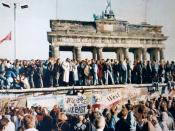The first Total War also known as the 'bloodiest' war of the century, WWI proved to have a great impact upon all of Europe. Politically, there is a clear scene of what impact the War had on the main powers in Europe: for some countries, such as France and Britain, the change in regime was merely slight, in Germany rather significant, whereas in Russia it proved drastic and sparked off two revolutions. Hence, there were several common aspects of political impacts, both direct and indirect.
One of the instances of indirect political impact of WWI was the steadfastly developed idea of 'unity' behind ones government, borne by feelings of patriotism. This mainly existed at the very beginning of war, for example in France, the famous 'Union Sacre' formed in around 1914 is an illustration of where socialist ideas were put side in favour of nationalist feelings. Similarly in Germany 'Burgfrieden' pursued contamination socialism at the time.
This enthusiasm could also be observed in Russia in early 1914, where everyone united behind the Tsar with constant demonstrations carrying his portraits. Such action, even from his opponents, again proves the great eagerness of nations to defeat the enemy and stresses a very new enhancement of nationalism above other political ideas throughout Europe. This accordingly strengthened the governments, providing them with an optimistic thrust as an initial political impact of WWI.
A more direct impact upon politics of the time was the governments' abrupt reduction of political freedom. This advanced as a consequence of mobilization of countries in order to support war effort, examples of which could be found in Britain, where magazines were subject to government censorship under the Defense of the Realm Act (DORA), introduced in 1914. The War Office supplied the magazine 'Great Push' with only information and photographs...



Comment
Very informative. You gathered a very interesting bundel of facts that I have neve heard about. Good job.
1 out of 1 people found this comment useful.